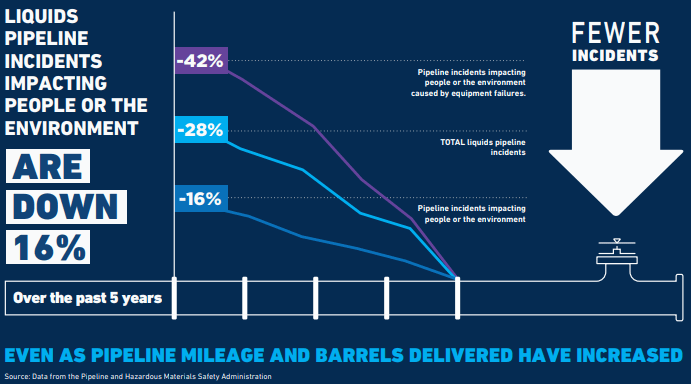Damage Prevention
Call 8-1-1 damage prevention programs help reduce excavation damage to buried pipelines.
Pipelines are one of the safest and most environmentally friendly ways of transporting energy across the country. A barrel of crude oil or petroleum product shipped by pipeline reaches its destination safely more than 99.999% of the time.
Pipeline companies take proactive steps to address health, safety, security, and environmental concerns of their employees and the public throughout the planning, construction, and operational phases of a pipeline. By evaluating, inspecting and maintaining pipelines through a program called integrity management, pipeline operators proactively work to prevent incidents. Integrity management programs have reduced incidents attributed to every major cause of pipeline failure, and the pipeline industry spends billions of dollars each year on safety initiatives like integrity management programs and research into new inspection technologies. Alongside integrity management, operators also employ robust public awareness, community engagement, and damage prevention programs to support the safe delivery of energy by pipeline.
Industry-Led Pipeline Safety Excellence Initiative
In 2014, liquid pipeline operators launched the Pipeline Safety Excellence Initiative reflecting their shared values of building and operating safe pipelines. Pipeline operators embrace jointly held safety principles and regularly engage each other as part of industry-wide safety driven committees, volunteering their time and resources to share safety lessons, develop industry-wide safety recommendations, and implement new safety programs.
And it’s working.

Pipeline incidents, while rare, do occur, which is why operators prepare for the unlikely event of an incident through the use of control room technologies and training to shut down pumps and quickly isolate pipeline segments during an emergency, if needed. Operators also develop emergency response plans, deploy resources, and work closely with local first responders to reduce the impacts of any release.
Read more about the industry’s commitment to pipeline safety and its goal of zero incidents in the 2022 API-LEPA Performance Report.
Call 8-1-1 damage prevention programs help reduce excavation damage to buried pipelines.
Using the One Call Center when digging around an energy pipeline is the only way to determine the exact location of a pipeline.
Operators use high-tech tools to detect ever-smaller issues in pipelines during regular inspections.
Pipeline operators prepare for the unlikely event of an incident through control room technologies, drills and training.
Pipeline operators have multiple ways to detect leaks from computer-based systems to regular patrols.
The pipeline industry’s highest priority is the safety of people and the environment in the continuous pursuit of operating with zero incidents.